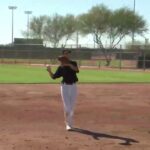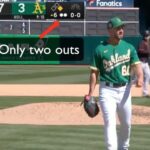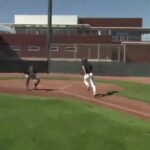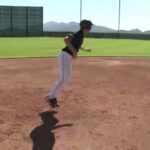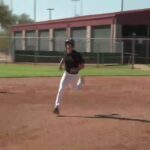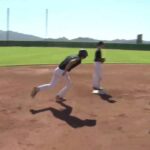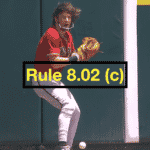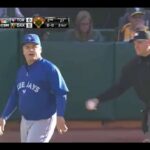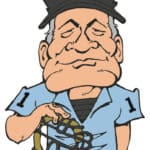8.02 Appeal of Umpire Decisions
(a) Any umpire’s decision which involves judgment, such as, but not limited to, whether a batted ball is fair or foul, whether a pitch is a strike or a ball, or whether a runner is safe or out, is final. No player, manager, coach or substitute shall object to any such judgment decisions.
Rule 8.02(a) Comment:
Players leaving their position in the field or on base, or managers or coaches leaving the bench or coaches box, to argue on BALLS AND STRIKES will not be permitted. They should be warned if they start for the plate to protest the call. If they continue, they will be ejected from the game.
(b) If there is reasonable doubt that any umpire’s decision may be in conflict with the rules, the manager may appeal the decision and ask that a correct ruling be made. Such appeal shall be made only to the umpire who made the protested decision.
(c) If a decision is appealed, the umpire making the decision may ask another umpire for information before making a final decision. No umpire shall criticize, seek to reverse or interfere with another umpire’s decision unless asked to do so by the umpire making it. If the umpires consult after a play and change a call that had been made, then they have the authority to take all steps that they may deem necessary, in their discretion, to eliminate the results and consequences of the earlier call that they are reversing, including placing runners where they think those runners would have been after the play, had the ultimate call been made as the initial call, disregarding interference or obstruction that may have occurred on the play; failures of runners to tag up based upon the initial call on the field; runners passing other runners or missing bases; etc., all in the discretion of the umpires. No player, manager or coach shall be permitted to argue the exercise of the umpires’ discretion in resolving the play and any person so arguing shall be subject to ejection. Notwithstanding the foregoing, correction of a missed ball-strike count shall not be permitted after a pitch is thrown to a subsequent batter, or in the case of the final batter of an inning or game, after all infielders of the defensive team leave fair territory.
Rule 8.02(c) Comment:
A manager is permitted to ask the umpires for an explanation of the play and how the umpires have exercised their discretion to eliminate the results and consequences of the earlier call that the umpires are reversing. Once the umpires explain the result of the play, however, no one is permitted to argue that the umpires should have exercised their discretion in a different manner. The manager or the catcher may request the plate umpire to ask his partner for help on a half swing when the plate umpire calls the pitch a ball, but not when the pitch is called a strike. The manager may not complain that the umpire made an improper call, but only that he did not ask his partner for help. Field umpires must be alerted to the request from the plate umpire and quickly respond. Managers may not protest the call of a ball or strike on the pretense they are asking for information about a half swing. Appeals on a half swing may be made only on the call of ball and when asked to appeal, the home plate umpire must refer to a base umpire for his judgment on the half swing. Should the base umpire call the pitch a strike, the strike call shall prevail. Appeals on a half swing must be made before the next pitch, or any play or attempted play. If the half swing occurs during a play which ends a half-inning, the appeal must be made before all infielders of the defensive team leave fair territory. Baserunners must be alert to the possibility that the base umpire on appeal from the plate umpire may reverse the call of a ball to the call of a strike, in which event the runner is in jeopardy of being out by the catcher’s throw. Also, a catcher must be alert in a base stealing situation if a ball call is reversed to a strike by the base umpire upon appeal from the plate umpire. The ball is in play on appeal on a half swing. On a half swing, if the manager comes out to argue with first or third base umpire and if after being warned he persists in arguing, he can be ejected as he is now arguing over a called ball or strike.
(d) No umpire may be replaced during a game unless he is injured or becomes ill. If there is only one umpire, he shall have complete jurisdiction in administering the rules. He may take any position on the playing field which will enable him to discharge his duties (usually behind the catcher, but sometimes behind the pitcher if there are runners). He shall be considered umpire-in-chief.
(e) If there are two or more umpires, one shall be designated umpire-in-chief and the others field umpires.



